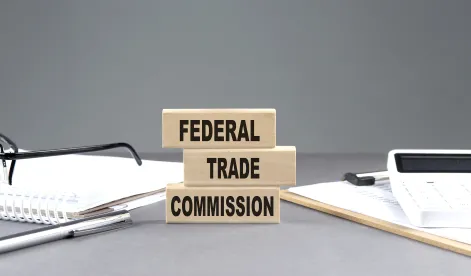What Happened
The Federal Trade Commission took several significant, unprecedented steps last week in its recent campaign against noncompetes. For the first time ever, the FTC sued to halt unlawful noncompete restrictions in the employment context. Only a day later, the agency proposed a rule that would ban nearly all employee noncompetes throughout the United States.
In its enforcement actions against three businesses—Prudential Security and Prudential Command Inc., O-I Glass Inc., and Ardagh Group S.A. and two related individuals, the FTC announced that it forced the companies to drop allegedly unlawful noncompetes imposed on their employees which covered thousands of workers and barred them from seeking similar work with another employer. These cases follow a statement issued by the FTC in July 2021 committing to vigorously enforce the Section 5 prohibition on unfair methods of competition with respect to employee noncompetes, with FTC Chair Lina M. Khan stating the enforcement actions “highlight how noncompetes can block workers from securing higher wages and prevent businesses from being able to compete.”
Separately, the FTC announced a sweeping new proposed rule that would completely ban employers from imposing noncompetes on their workers and invalidate all such existing agreements. If the rule becomes final, it will upend decades of legal precedent that permits employers to enter into noncompetes with their workers if there is a business justification for the restriction, provided the restriction is reasonable in duration and scope,1 and will have wide-ranging impact on employers who use noncompetes or have policies that operate as noncompetes (e.g., broad nondisclosure policies).
Although the proposed rule will certainly face legal challenges, the FTC’s moves signal that the agency intends to take aggressive measures to regulate competition in the workplace.
The Full Story
The Administrative Complaints
The FTC challenged noncompete agreements used by three companies that employ workers ranging from “low wage security guards” to skilled and experienced glass container manufacturers. The complaint against Prudential Security, Inc., Prudential Command Inc., and their owners, alleged that the Michigan-based companies exploited their bargaining power against low-wage security guards, requiring them to sign restrictive contracts that prohibited them from working for a competing business within 100 miles of their job site for two years after leaving Prudential, and included a $100,000 penalty for an alleged violation of the clause.
The FTC also issued complaints against O-I Glass, Inc. and Ardagh Group S.A., the two largest manufacturers of food and beverage containers in the US. According to the FTC, this industry is highly concentrated and the companies’ use of noncompetes has likely reduced competition by impeding the entry and expansion of rivals. O-I Glass, an Ohio-based company, used noncompete restrictions that typically banned workers from working for, owning, or being involved in any business in the US selling similar products or services for a period of one year after leaving the company. In its complaint against Ardagh Group S.A., the FTC alleged the company’s restrictions typically banned workers from directly or indirectly performing “the same or substantially similar services” for any other business in the United States, Canada, or Mexico, for a period of two years after leaving Ardagh.
Each of the orders prohibit the companies from enforcing, threatening to enforce, or imposing noncompetes against any relevant employees. In addition, the orders require the companies to:
- void and nullify the noncompetes without penalizing the affected employees;
- provide copies of the order to current and past employees who were subject to the challenged noncompetes and a copy of the complaint and order to current and future directors, officers, and employees of the companies who are responsible for hiring and recruiting; and
- provide a clear and conspicuous notice to any new relevant employees that they may freely seek or accept a job with any company or person, run their own business, or compete with them at any time following their employment, for the next ten years.
Notably, the FTC’s decision was not unanimous. A sharp dissent from Republican Commissioner Christine Wilson argued there was no evidence that the noncompete agreements had an anticompetitive effect on any relevant market. Wilson also expressed concerns that the case would set bad precedent that could have consequences for the economy and for the FTC as an institution, saying the action “foreshadows how the Commission will apply the new Section 5 Policy Statement.” The FTC issued its new Section 5 Policy Statement in November 2022, with a declaration of “the agency’s intent to exercise its full statutory authority against companies that use unfair tactics to gain an advantage instead of competing on the merits,” and which contends that the agency’s authority under Section 5 of the FTC Act “reaches beyond the Sherman and Clayton Acts to encompass various types of unfair conduct that tend to negatively affect competitive conditions.”
The Proposed Rule
On January 5, 2023, the FTC announced a new proposed rule that would ban noncompetes for workers in most circumstances. The FTC estimated that the rule could increase wages by nearly $300 billion per year, purportedly due to negative effects noncompetes have on wages, innovation, and entrepreneurialism.
The proposed rule would apply to employers who “hire[] or contract[] with a worker to work for the person,” meaning it will cover all private employers. It broadly defines noncompete agreements as “a contractual term between an employer and a worker that prevents the worker from seeking or accepting employment with a person, or operating a business, after the conclusion of the worker’s employment with the employer.” To determine whether a contractual clause is a noncompete, the proposed rule would require a functional test to determine if it would have “the effect of prohibiting the worker from seeking or accepting employment with a person or operating a business after the conclusion of the worker’s employment with the employer.”
The proposal also identifies two types of agreements that would constitute impermissible noncompetes: (i) a clause “written so broadly that it effectively precludes the worker from working in the same field” after the worker’s employment; and (ii) obligations for workers to cover training costs if they end their employment too soon, provided the obligation is not “reasonably related to the costs the employer incurred for training the worker.” Moreover, the proposed rule may affect other agreements employers commonly enter into with their workers, including nondisclosure agreements which, if drafted too broadly, risk running afoul of (i) above.
Critically, the proposed rule is also backward looking. It would invalidate—and require employers to rescind—existing noncompetes. It would also make it illegal for an employer to:
- enter into or attempt to enter into a noncompete with a worker;
- maintain a noncompete with a worker; or
- represent to a worker, under certain circumstances, that the worker is subject to a noncompete.
However, it also contains certain exceptions to the blanket ban. For example, an individual may enter into a noncompete agreement if it is in connection with the sale of a business or substantially all of a business’s assets where the individual subject to the noncompete is a substantial owner—defined as an individual “holding at least a 25 percent ownership interest in a business entity.”
Timeline for the Proposed Rule
The FTC voted 3 to 1 to publish the Notice of Proposed Rulemaking (“NPRM”) – with Commissioner Wilson dissenting – which is the first step in the FTC’s rulemaking process. The notice invites the public to submit comments on the proposed rule, which will be due 60 days after it is published in the Federal Register. Once the public comment period is over and the Commission has considered the public’s comments, the FTC has indicated that it intends to move the rule quickly to finalization. Even so, the rulemaking process will likely take several months to complete.
Once the rule is finalized, enforcement may begin 180 days thereafter. This 180-day period would give employers time to determine whether they have noncompete agreements that fall within the scope of the rule and how they are impacted. Legal challenges are also likely to be widespread during this period which could take months or years to come to resolution in the courts.
Why This Matters
Scrutiny from antitrust enforcement agencies to curb anticompetitive conduct in the labor market is not new. The FTC’s enforcement action and proposed rulemaking follows President Biden’s July 2021 Executive Order on competition encouraging the FTC to use rulemaking to limit the use of noncompete agreements. However, the latest actions by the FTC clearly signal the agency’s interest in noncompete agreements in the employment arena. More generally, the FTC’s actions demonstrate its commitment to apply the Section 5 Policy Statement in a broad and sweeping manner.
Even so, the proposed rule will likely face significant challenges in the courts over the scope and the powers that have been delegated to the FTC by Congress to regulate competition, which will likely delay its enforcement. As Commissioner Wilson wrote in her dissent to the NPRM, it is a “radical departure” from “years of legal precedent that employs a fact-specific inquiry into whether a noncompete clause is unreasonable in duration and scope, given the business justification for the restriction.” The United States Chamber of Commerce also expressed its belief that the NPRM is “blatantly unlawful” which suggests they may challenge the proposed rule in court.
The questions and debates surrounding the NPRM will likely relate to the scope and contours of the FTC’s rulemaking authority. Legal challenges may include:
- Whether the FTC has authority under Section 5 of the FTC Act to engage in rulemaking to prohibit unfair methods of competition. In response to National Petroleum Refiners, a 1973 D.C. Circuit Court of Appeals decision which held the FTC has the authority to promulgate “substantive rules” about what constitutes unfair methods of competition, Congress enacted the Magnuson-Moss Act which narrows the FTC’s authority to enact substantive rulemaking.2 Commissioner Wilson argued in her dissent that Congress’ decision to omit unfair methods of competition rulemaking from the law—immediately following the decision in National Petroleum Refiners—is additional evidence that Congress has not clearly authorized the FTC to make competition rules that may have significant political or economic consequences.
- Whether the proposed rule violates the “major questions” doctrine. In West Virginia v. EPA, a 2022 Supreme Court case challenging agency rules to address climate change, the Court held that when federal agencies issue regulations with broad economic and political consequences, the regulations are presumptively invalid unless Congress specifically authorized the action.3 Opponents of the FTC’s proposed rule could argue that the rule, which by design has sweeping economic and political effects, exceeds the limits imposed by the Court’s major questions doctrine in the absence of clear Congressional authorization.
As the FTC and the Biden Administration continue to push an aggressive antitrust enforcement agenda, including in the workplace, companies should review their use of noncompete provisions with counsel and consider the level of antitrust risk they pose. Noncompete agreements present antitrust, labor and employment, and state law issues.
1 There are notable exceptions to this precedent in state law. California, North Dakota, and Oklahoma generally do not permit noncompetes. Others, including Arizona, Connecticut, Florida, Georgia, Indiana, Iowa, Massachusetts, Minnesota, Nebraska, New Hampshire, New York, Ohio, and Pennsylvania, permit them under narrower circumstances (some recent efforts have imposed income restrictions on the use of noncompetes). The FTC’s proposed rule would preempt all state laws that permit broader use of noncompetes.
2 Nat’l Petroleum Ref’rs Ass’n v. FTC, 482 F.2d 672 (D.C. Cir. 1973); cf. Snap-On Tools Corp. v. Fed. Trade Comm’n, 321 F.2d 825, 837 (7th Cir. 1963) (holding noncompetes are not per se illegal under Section 5).
3 West Virginia v. EPA, 142 S. Ct. 2587 (2022).









 />i
/>i

